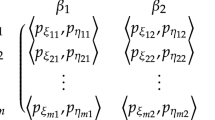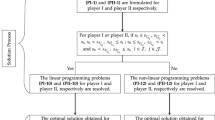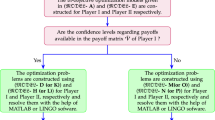Abstract
In our daily life, we encounter many problems with uncertainty and vagueness in nature. Mathematical formulations and solutions of these problems are not easy and appear to be a challenging task to the researchers. Crisp sets and fuzzy sets suffer to deal with these. Hesitant fuzzy set—a protracted version of fuzzy set—comes into the fore to bridge over the gap. The set of all possible values of membership of hesitant fuzzy set might be considered as a set of possible intervals. Non-membership functions are also added therein to get intuitionistic interval-valued hesitant fuzzy numbered sets. In the literature, several aggregation operators exist, and here we consider a new one which is easy to apply in our formulated problems. Here, a matrix game whose payoffs are intuitionistic interval-valued hesitant fuzzy numbers is solved using our proposed aggregation operator. A tangible management problem with numerical values is demonstrated here to verify the applicability of the new aggregation operator over the matrix game.
Similar content being viewed by others
References
Ammar ES, Brikaa MG (2019) On solution of constraint matrix games under rough interval approach. Granul Comput 4(3):601–614
Atanassov KT (1986) Intuitionistic fuzzy sets. Fuzzy Sets Syst 20:87–96
Atanassov KT, Gargov G (1989) Interval valued intuitionistic fuzzy sets. Fuzzy Sets Syst 31(3):343–349
Bhaumik A, Roy SK, Li DF (2017) Analysis of triangular intuitionistic fuzzy matrix games using robust ranking. J Intell Fuzz Syst 33:327–336
Campos L (1989) Fuzzy linear programming models to solve fuzzy matrix games. Fuzz Sets Syst 32:275–289
Card D (1990) Strikes and wages: a test of an asymmetric information model. The Quart J Econs 105(3):625–659
Chen TY (2016) An interval-valued intuitionistic fuzzy permutation method with likelihood based preference functions and its application to multiple criteria decision analysis. Appl Softw Comp 42:390–409
Chen N, Xu ZS (2014) Properties of interval-valued hesitant fuzzy sets. J Intell Fuzz Syst 27:143–158
Chen SM, Lee LW, Liu HC, Yang SW (2012) Multiattribute decision making based on interval-valued intuitionistic fuzzy values. Expert Systs Appl 39:10343–10351
Chen SM, Yang MW, Yang SW, Sheu TW, Liau CJ (2012) Multicriteria fuzzy decision making based on interval-valued intuitionistic fuzzy sets. Expert Systs Appl 39:12085–12091
Chen N, Xu ZS, Xia MM (2013) Interval-valued hesitant preference relations and their applications to group decision making. Knowl Based Syst 37:528–540
Cheng J, Leung J, Lisser A (2016) Random-payoff two-person zero-sum game with joint chance constraints. Euro J Oper Res 252(1):213–219
Cooke FL, Xu J, Bian H (2019) The prospect of decent work, decent industrial relations and decent social relations in China: towards a multi-level and multi-disciplinary approach. Int J Human Reson Manag 30(1):122–155
Das CB, Roy SK (2010) Fuzzy based GA for entropy bimatrix goal game. Int J Uncer Fuzz Knowl Based Syst 18(6):779–799
Farhadinia B (2013) A novel method of ranking hesitant fuzzy values for multiple attribute decision-making problems. Int J Intell Syst 28(8):752–767
Gabroveanu M, Iancu I, Cosulschi M (2016) An Atanassov’s intuitionistic fuzzy reasoning model. J Intell Fuzz Syst 30(1):117–128
Ishibuchi H, Tanaka H (1990) Multiobjective programming in optimization of the interval objective function. Eur J Oper Res 48:219–225
Jana J, Roy SK (2018) Dual hesitant fuzzy matrix games: based on new similarity measure. Soft Comput. https://doi.org/10.1007/s00500-018-3486-1
Jana J, Roy SK (2018) Solution of matrix games with generalised trapezoidal fuzzy payoffs. Fuzz Inform Eng 10(2):213–224
Kaufman BE (2010) The theoretical foundation of industrial relations and its implications for labor economics and human resource management. Indus Labor Relat Rev 64(1):74–108
Khan I, Mehra A (2019) A novel equilibrium solution concept for intuitionistic fuzzy bi-matrix games considering proportion mix of possibility and necessity expectations. Granul Comput. https://doi.org/10.1007/s41066-019-00170-w
Li DF (2014) Decision and game theory in management with intuitionistic fuzzy sets (studies in fuzziness and soft computing 308). Springer, Berlin
Lin-Hi N, Blumberg I (2017) The power(lessness) of industry self-regulation to promote responsible labor standards: insights from the Chinese toy industry. J Bus Ethics 143:789–805
Moore RE (1979) Method and application of interval analysis. SIAM, Philadelphia
Neumann J, Morgenstern O (1944) Theory of games and economic behavior. Princeton University Press, Princeton
Peng DH, Gao CY, Gao ZF (2013) Generalized hesitant fuzzy synergetic weighted distance measures and their application to multiple criteria decision-making. Appl Math Modell 37(8):5837–5850
Peng DH, Wang H (2014) Dynamic hesitant fuzzy aggregation operators in multi-period decision making. Kybernetes 43(5):715–736
Reder MW, Neumann GR (1980) Conflict and contract: the cases of strikes. J Polit Econ 88(5):867–886
Rodriguez RM, Martinez L, Herrera F (2012) Hesitant fuzzy linguistic term sets for decision making. IEEE Trans Fuzz Syst 20(1):109–119
Roy SK, Bhaumik A (2018) Intelligent water management: a triangular type-2 intuitionistic fuzzy matrix games approach. Water Reson Manag 32:949–968
Roy SK, Das CB (2009) Fuzzy based genetic algorithm for multicriteria entropy matrix goal game. J Uncertain Syst 3(3):201–209
Roy SK, Mondal SN (2016) An approach to solve fuzzy interval-valued matrix game. Int J Oper Res 26(3):253–267
Roy SK, Mula P (2013) Bi-matrix game in bi-fuzzy environment. J Uncertain Anal Appl 1(11):1–17
Roy SK, Mula P (2014) Rough set approach to bimatrix game. Int J Oper Res 23(2):229–244
Roy SK, Mula P (2016) Solving matrix game with rough payoffs using genetic algorithm. Oper Res Int J 16:117–130
Torra V (2010) Hesitant fuzzy sets. Int J Intell Syst 25(6):529–539
Turksen IB (1986) Interval-valued fuzzy sets based on normal forms. Fuzz Sets Syst 20:191–210
Wei GW, Wang HJ, Zhao XF, Lin R (2014) Hesitant triangular fuzzy aggregation in multiple attribute decision making. J Intell Fuzz Syst 26(3):1201–1209
Wei GW (2013) Some hesitant interval-valued fuzzy aggregation operators and their applications to multiple attribute decision making. Knowl Based Syst 46:43–53
Xia MM (2018) Interval-valued intuitionistic fuzzy matrix games based on Archimedean t-conorm and t-norm. Int J Gen Syst 47(3):278–293
Xia MM, Xu ZS (2011) Hesitant fuzzy information aggregation in decision making. Int J Approx Reason 52(3):395–407
Xu ZS, Xia MM (2011) Distance and similarity measures for hesitant fuzzy sets. Inform Sci 181(11):2128–2138
Xu ZS, Yager RR (2006) Some geometric aggregation operators based on intuitionistic fuzzy sets. Int J Gen Syst 35(4):417–433
Yager RR (1988) On ordered weighted averaging aggregation operators in multicriteria decision making. IEEE Trans Syst Man Cyber 18(1):183–190
Yu DJ, Zhang WY, Xu YJ (2013) Group decision making under hesitant fuzzy environment with application to personnel evaluation. Knowl Based Syst 52:1–10
Zadeh LA (1965) Fuzzy sets. Inform Contr 8(3):338–353
Zhou X, Li Q (2014) Multiple attribute decision making based on hesitant fuzzy Einstein geometric aggregation operators. J Appl Math 2014:14 (Article ID 745617)
Zhu B, Xu ZS, Xia MM (2012) Dual hesitant fuzzy sets. J Appl Math 2012:13 (Article ID 879629)
Acknowledgements
The authors are thankful to the editors, and anonymous reviewers for their insightful comments which improved the quality of the paper.
Author information
Authors and Affiliations
Corresponding author
Ethics declarations
Conflict of interest
The authors declare that they have no competing interest.
Ethical approval
This article does not contain any studies with human participants or animals performed by any of the authors.
Additional information
Publisher's Note
Springer Nature remains neutral with regard to jurisdictional claims in published maps and institutional affiliations.
Rights and permissions
About this article
Cite this article
Bhaumik, A., Roy, S.K. Intuitionistic interval-valued hesitant fuzzy matrix games with a new aggregation operator for solving management problem. Granul. Comput. 6, 359–375 (2021). https://doi.org/10.1007/s41066-019-00191-5
Received:
Accepted:
Published:
Issue Date:
DOI: https://doi.org/10.1007/s41066-019-00191-5




